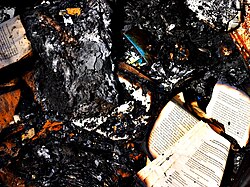User:Gmaxwell

This is the user page of Wikimedian Gregory Maxwell.
Why I contribute to Wikimedia
[edit]Although I lurked for a long time before editing, I have only been an active Wikimedia contributor since late 2004.
I contribute to Wikimedia because I value freedom. I strongly believe that no person can be considered a free person if he is unable to study, transform, share, and build upon an enormous library of the intellectual works of others. Modern societies have compromised these freedoms in an effort to ensure that a wealth of such works is created and made available, and by most measures they have been enormously successful.
The birth of instantaneous electronic communications has dramatically changed the costs of creating and reproducing information. These changes have made possible new methods of encouraging the creation and distribution of knowledge which have far fewer limitations on the intellectual freedom of man. While it is too premature to declare the old systems obsolete, there is no fundamental conflict: through concepts like copyleft we can use these new methods in parallel with, and under the rules of, the old.
For mankind to reap the benefits of intellectual freedom made possible by electronic communications we must first have an enormous library of free works. Wikimedia is building that library.
It is my hope that my own meager contributions will provide significant value beyond their direct worth by also acting as an incentive to others to contribute their own efforts to this collective library of all mankind.
On project policy
[edit]Claims of bad faith are often used to justify actions without a rational basis in fact. Intent is very difficult to determine, especially online, and almost impossible to gain consensus around. It is much easier to gather consensus around actions because they are measurable and can be considered objectively. Furthermore, many cases of bad actions have been made in good faith. There is never a reason to stray from assuming good faith because our policy acts almost exclusively on actions, not intent. The cost of incorrectly labeling someone a malfeasant is potentially quite high, while the cost of enduring a few more bad actions before we meet a criteria high enough for intervention is necessarily low. In short, it is my view that we must always presume good faith, and block bad actors.
Authorizations
[edit]As indicated explicitly on some of my contributions, if you are a publisher and you want me to write you a release granting you authorization to use my works in your products or a license with the terms of your choice: I am willing to negotiate reasonable terms for reasonable agreements. Use the "E-mail this user" link on the left sidebar.




Some SVG contribs
[edit]Some personal media guidelines
[edit]- Only media created by members of our collective Wikimedia community and others who are actively working with our community can truly represent the best we have to offer. Part of the advantage of our community is communication with the authors, suggestions, and collaborations. Even on commons we are not just an image bucket. I will never personally support a total outsider's media for featured status, and will actively oppose permitting any such content into contests.
- Diagrams and illustrations should be in SVG format, even at the expense of minor quality aspects, such as fuzzy dropshadows (our SVG rasterizer does not yet support filters). The increase in modification ease outweighs other factors.
- Label text in SVGs must be text elements not paths, even if it reduces the visual quality of the work. The ability to easily translate SVGs and search their content in the future is very important.
- Raster images should be at the highest resolution available. Images should be at least 1200 pixels along on their larger axis. I would suggest higher, but I do support photographers only freely licensing a reduced resolution version of their image to preserve some of the commercial value in the full resolution image.
- Sometimes clean macro photographs of small objects, or images suffering other technological limitations, can still be acceptable below 1200 pixels, but whatever size we have should be the highest resolution available.
- Although I support photographers providing somewhat reduced resolution versions, that does not excuse them from the need to provide high resolution images.
- It is almost as important that an image be correctly categorized and described in as many languages as possible as it is for the image itself to be of high quality. (My own work has been lacking in that regard).
- Media should not impose any language dependencies unless absolutely needed.
- For content where there is a preferred form for modification, the preferred form should be submitted. All submitted content must be in the freest formats possible. It is preferable for content to be created entirely with free tools, so that the work is as reproducible by others as possible and it is most likely that the preferred format is sufficiently free.
- Not all display devices display images the same. Creators of content should endeavor to use a properly calibrated sRGB display. Creators should be aware that some users have low quality, miscalibrated, or outright broken displays and should they endeavor to produce content which is still usable on such displays. However the only sane target can be a properly calibrated display, so criticism on lightness should come only from users with known good displays unless the criticism is of the form "it's hard to make out this image on my display".
- It is more important that we avoid debating the color of the bike shed than having the absolutely highest quality media. Issues which are highly subjective, ones which users may disagree about and which can not be subject to clear explainable criteria, should only be raised as suggestions in the featured media process. Hanging an oppose over users on a minor point in taste will ultimately reduce the quality of our work even if the suggestion is valid, because it will discourage contributors from further contribution. If a user's technical and artistic judgment was great enough to create the media worthy of consideration they should be left to decide over such minor details. The less collaborative the work, the more the judgement over minute details should be left to its primary creator.
| Licensed under the GNU Free Documentation License, and nothing else | |
| My contributions are only available under the GFDL version 1.2. I do not believe the Creative Commons sharealike license provides sufficient protection against technological means which may be used in the future to deny me the right to use works derived from mine, or may be used to deny me the ability to publish altogether. I am also concerned that the Creative Commons organization is creating substantial confusion with their lack of genuine commitment to truly free content and I do not wish my work to be associated with their brand. | |
I recognize that this user page belongs to the Wikimedia commons project and not to me personally. As such, I recognize that I am expected to respectfully abide by community standards as to the presentation and content of this page, and that if I do not like these guidelines, I am welcome either to engage in reasonable discussion about it, to publish my material elsewhere, or to leave the project.






















